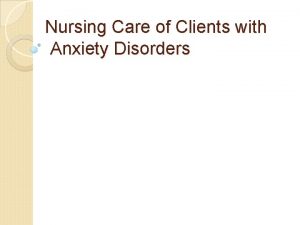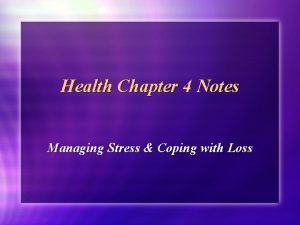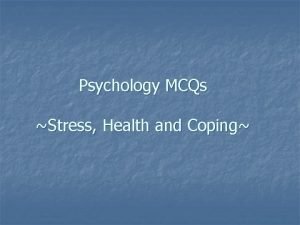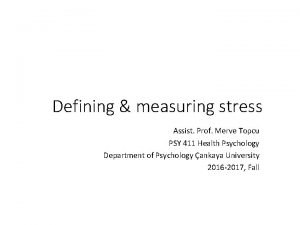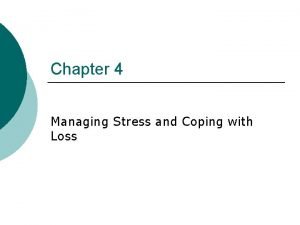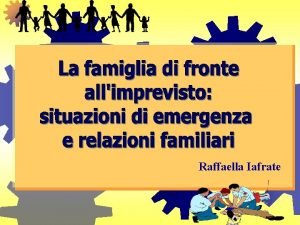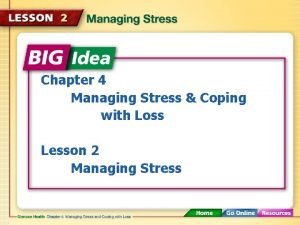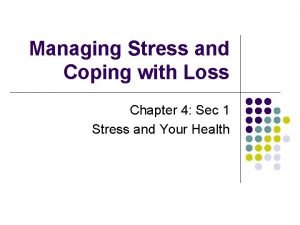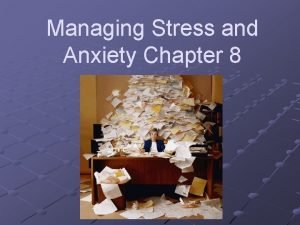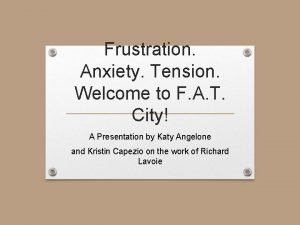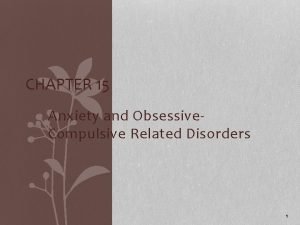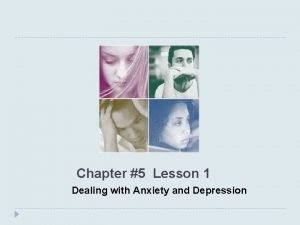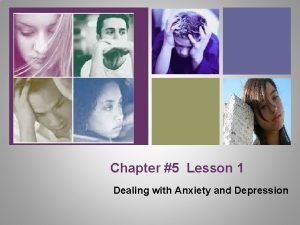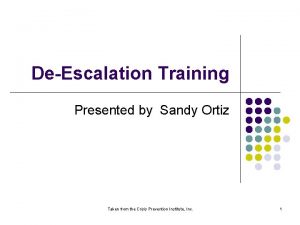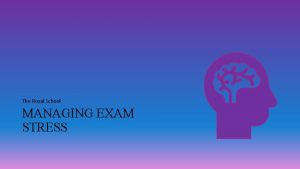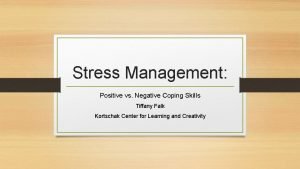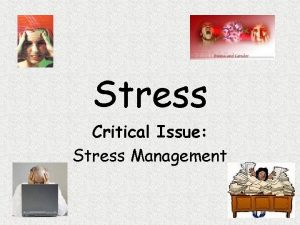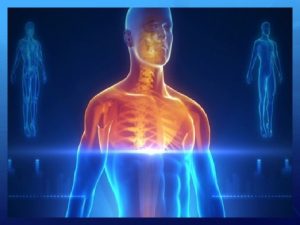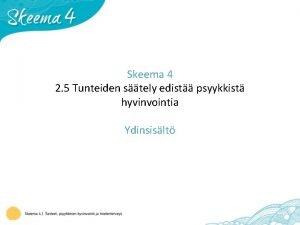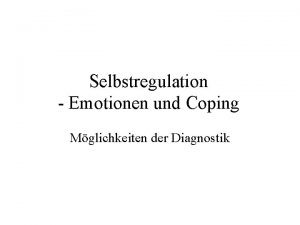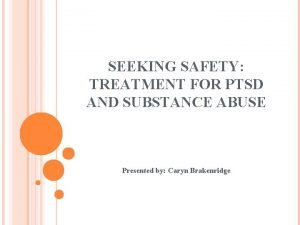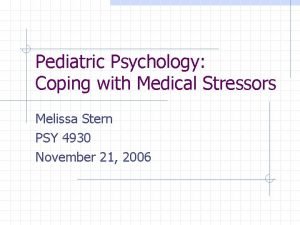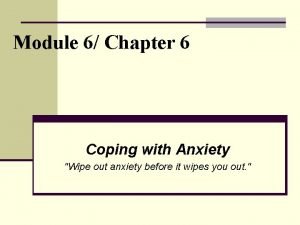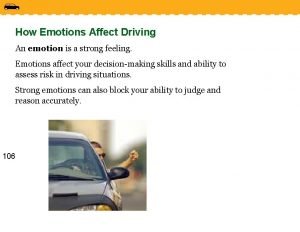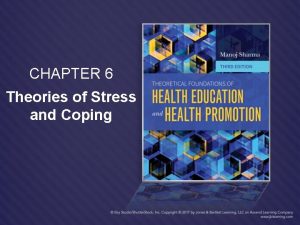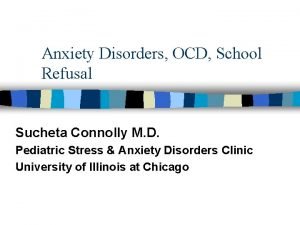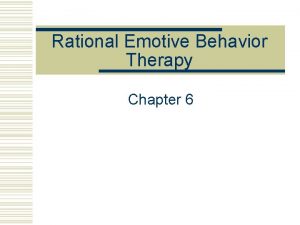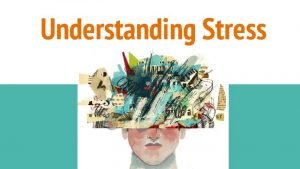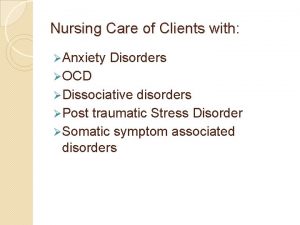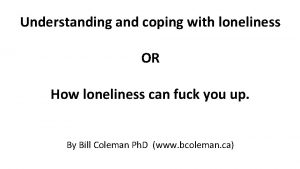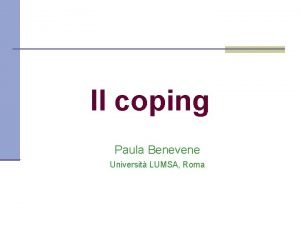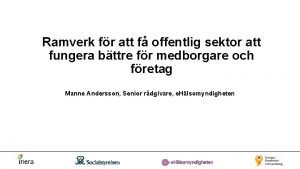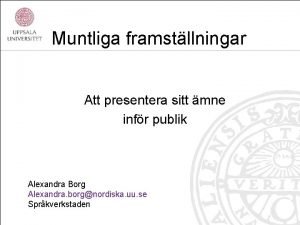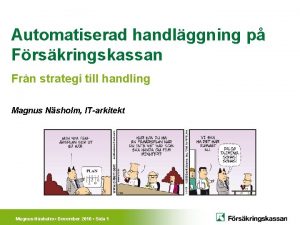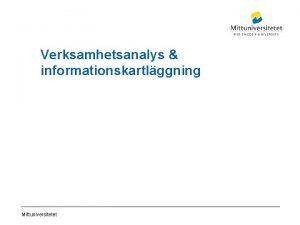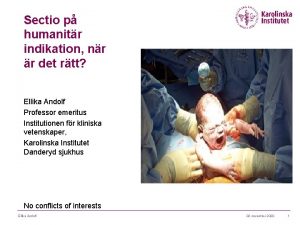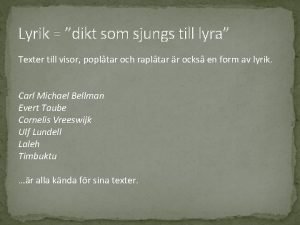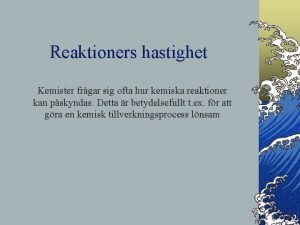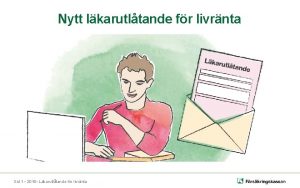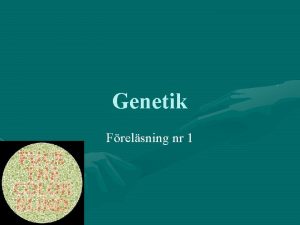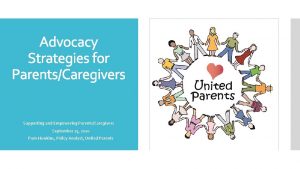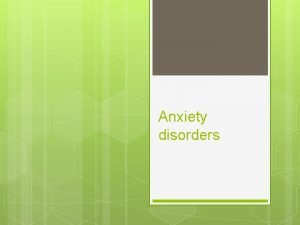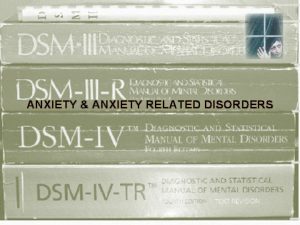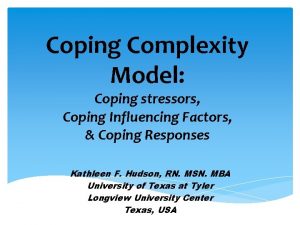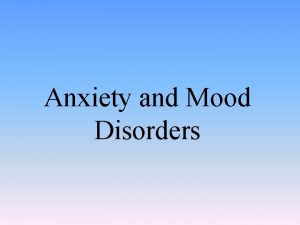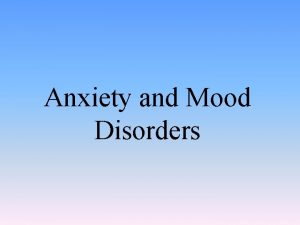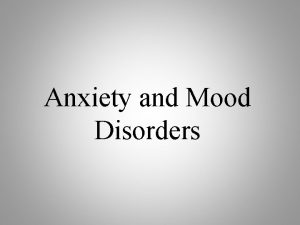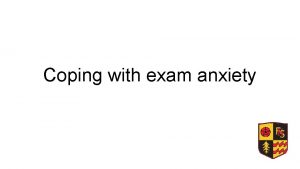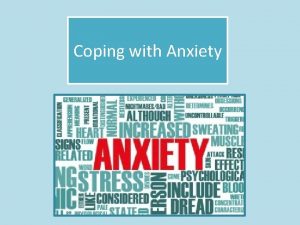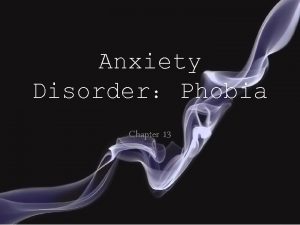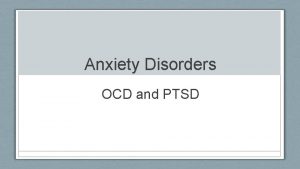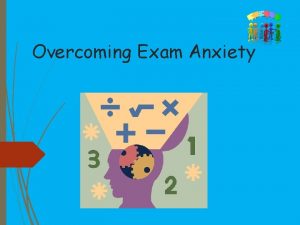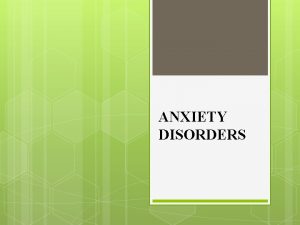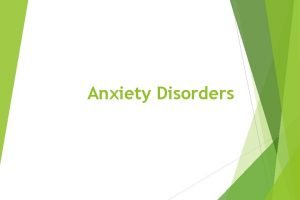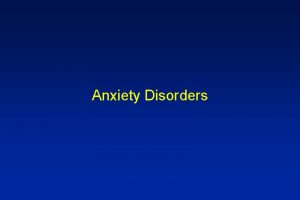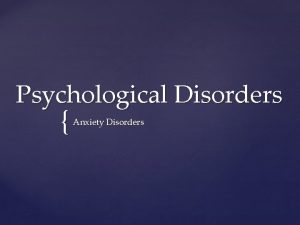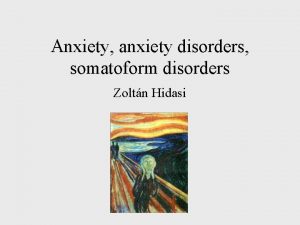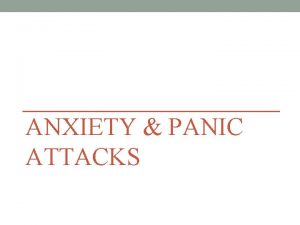Coping with Anxiety Information for ChildrenYouth and ParentsCaregivers


























































































































- Slides: 122

Coping with Anxiety: Information for Children/Youth and Parents/Caregivers Dr. Michael Cheng, Children’s Hospital of Eastern Ontario (CHEO) Except where otherwise noted, content is licensed under a Creative Commons Attribution – Non-Commercial License; images are royalty-free stock photos

About this Presentation • This presentation is meant for parents and caregivers of child/youth who are coping with anxiety • It covers • What is anxiety? • What can parents and caregivers do to support your child with anxiety?

When do normal worries become a disorder? • Everyone gets worries from time to time • Having just enough worries about things is actually healthy • But if you have so many worries that it gets in the way of life, we call it may be an Anxiety Disorder (or Anxiety Condition)

Main types of Anxiety Disorders • • Generalized anxiety disorder Separation anxiety disorder Panic disorder Obsessive compulsive disorder Phobias Social (phobia) / social anxiety Anxiety Disorder Not Otherwise Specified

How common are anxiety disorders • The most common emotional/ behavioral problem • 6. 5% of children/youth at any one time • I. e. in a classroom of 30, there at least 1 -3 people with anxiety conditions!

Why Do We Have Anxiety? Q. How did we survive 10, 000 years ago?

Q. Where do you get your food from nowadays?

A. The fridge. Or grocery stores. Where we get our food nowadays!

Q. But where did people get their food 10, 000 years ago?

A. We survived in the wild… We hunted or gathered our food. .

To survive in the wild…

To survive in the wild… • You need to be confident enough… • You can’t be too anxious or scared because if you were too scared, then you'd stay in your cave all day.

Q. What would happen if you had absolutely no fear at all?

A. Having absolutely no fear at all can get you into big trouble!

Balance is the key • Having just enough anxiety is the key • Too little is not good • Too much is not good • The key is to have JUST ENOUGH

What happens in the body during anxiety / stress?

Nature gave our brains an alarm to help us deal with dangers. . .

Our body’s alarm will go off in times of danger, like a sabre tooth tiger jumping out at us…

Q. What are the main ways our body reacts to danger?

Q. What are the main ways our body reacts to danger?

A. We are wired to try different strategies to deal with danger… … 1) Fight: Fighting the danger 2) Flight: Running away from the danger, 3) Freeze: When we are too overwhelmed, our bodies will sometimes just freeze, like a “deer in headlights”

What happens in the brain? • Adrenaline (aka norepinephrine) causes: • • • Eyes dilate (to see better) Heart pumps faster (more blood to muscles) Breathing increases (more oxygen) Stomach stops working (more blood for muscles) Sweating (to cool down body when muscles get going) • All this helps the person to either • Fight • Flight

Why is anxiety so common these days? • Body’s alarm is good with episodic dangers • E. g. being attacked by a wild animal, followed by no stress once the danger is gone • Body’s alarm is not good with modern “dangers”, which might not be life threatening, but are constant and don’t go away • E. g. school pressure • E. g. social pressure

What makes us feel safe?

What else do we need for mental health and resiliency? Let’s take a look at our history as human beings on this planet…

Our history as humans… Modern society and technology is a mere blip on the timeline… Modern humans evolved 200, 000 years ago Society and technology i. Pads, cellphones 6, 000 years ago 6 years ago (2010)

How things have changed… In the past… Nowadays… We lived closely with nature We live in cities, and spent most of our time indoors We walked to places We drive We spent a lot of time in nature We spent our time indoors We interacted with people face-to-face We spent more time in front of a screen than in front of fellow human beings We had a wide circle of family and friends We have smaller families and narrower circles of (true) friends In the evening, families would spent time together In the evening, families are often doing separate activities In the 1970’s, one income earner could support a family In 2015, two income earners are required to support a family Children were closely connected to family and had face-to-face friends Children are often disconnected from parents, and more connected to technology

As a result, human beings are hardwired to require… Nature Deep connections to people, in particular family Other meaningful things such as community, culture, spirituality, etc. . .

As a result, child/youth are hardwired to require… Nature Deep connections to people, in particular family Other meaningful things such as community, culture, spirituality, etc. . .

Evidence confirms that adult-child relationships are key • Key component to resiliency is positive social and emotional connections between • Teens and supportive adults • Teens and school • Teens and community • If you have strong connections with adults, then peer connections are not as important (or unnecessary) • Teens with strong connections with adults, even if socially isolated from peers are still resistant to depression/suicide Keith, 2012

Nature is essential for health • Despite modern society, most of our existence has always been closely connected with nature • Modern ‘westernization’ has doubled our life expectancy, but has created emergence of new, serious diseases, e. g. depression / suicide • Studies show that nature helps physical and emotional health • Improves depression, anxiety (Berman, 2012), attention deficits (Taylor and Kuo, 2009) • Reduces aggression (Kuo et al. , 2001) • Reduces myopia • Reduces cardiovascular problems (Beyer, 2014) • Wilderness course (2 -weeks) has psychological/lifestyle benefits (Greenway, 1995) • As a public health intervention, increasing exposure to nature is perhaps one of the most cost-effective interventions (Maller et al. , 2006)

How things have changed… In the past… Nowadays, we spend our time. . . We lived closely with nature In cities, indoors We walked to places Driving everywhere We spent a lot of time in nature In front of a screen rather in front of fellow human beings We interacted with people face-to-face With smaller families and narrower circles of (true) friends, i. e. the village is no more We had a wide circle of family and friends Even as families together in the evening, often doing separate activities In the evening, families would spent time together Busy working, with two income earners required to support a family In the 70’s, one income earner could support a family Disconnected from families, friends, nature and more connected to technology

As a result (of modern society), many adults are disconnected and over-connected to things that do not provide happiness… Nature Technology Deep connections to people, in particular family Peers Pleasing the self through materialism, consumerism… Other meaningful things such as community, culture, spirituality, etc. . .

As a result (of modern society), many children/youth are disconnected and over-connected to things that do not provide happiness… Nature Technology Deep connections to people, in particular family Peers Pleasing the self through materialism, consumerism… Other meaningful things such as community, culture, spirituality, etc. . .

In summary, we feel safe when… • At a very deep level, human beings feel safe when we are • Connected to other people at a deep level • Levels of connection include • Physical connection • Connection through things in common • Emotional connection, e. g. feeling that others understand how we feel, and that they accept us no matter what… • Connected to nature and the outdoors • Though we live indoors in cities nowadays, throughout most of history we lived alongside nature; so it is no wonder that our brains require nature to feel good

Why do so many of today’s children/youth detach from parents? • Peer oriented culture • Today’s television, movies, music promotes the view that parents are incompetent, and that friends (and having things, i. e. consumerism) are the most important goal in life • Modern technology such as internet, cell phones, social media • Studies confirm that while our media may help keep us more connected superficially, for many people they damage deeper, more intimate connections, e. g. “Facebook Depression” • Violence • Desensitizing effects of video game, but also internet, television and movie violence has the effect of reducing empathy for others, but also causes anxiety by directly teaching one that the world is an unsafe place

Video games can make us feel unsafe • Video games give our brains a jolt of adrenaline and dopamine which is why they can be really enjoyable to play • However, hours of video games can make people feel unsafe American Academy of Paediatrics, Media Policy Statement

Modern media such as TV can make us feel unsafe • Typical North American child watches 28 -hrs of TV per week, more time than is spent in school • Studies show that we absorb the messages from media • Unfortunately, many of the messages from media can make us feel the world is unsafe, whether it is horror movies, science fiction, or even just the evening news • If we didn’t absorb media messages, then the Advertising Industry wouldn’t exist! • Most of us can remember a time when we stayed up late after watching a particularly scary movie! American Academy of Child and Adolescent Psychiatry, http: //www. aacap. org/cs/root/developmentor/the_impact_of_m edia_violence_on_children_and_adolescents_opportunities_for_ clinical_interventions

What to do if you suspect anxiety

Start by seeing the family physician or paediatrician. . . • Assessment • Questions to learn more about the problem and whether or not it really is anxiety • Seeing if any medical conditions contribute • Diagnosis • Treatment plans

Attachment Strategies for Anxiety

Ensure strong attachments and relationships with your child • Studies show that the strongest resiliency factor for mental health is strong connections between a parent and child • Humans are a social species • Children are dependent on parents for survival • The need to connect is hard-wired into all of us, and the need to connect is important throughout the life span • This need for connection or attachment is thus crucial for • Normal physical, cognitive and emotional development • Happiness and contentment

How strongly does your child try to attach to you? • Does your child want to spend 1: 1 time with you? • Does your child want to be like you or have things in common with you? • Does your child try to be loyal to you and take your side? • Does your child try to be useful or helpful to you? • Does your child express love and affection to you? • Does your child talk to you about feelings, and do you provide 100% unconditional acceptance? • Neufeld, 1991

How strongly do you try to attach to your child? • Does your child want to spend 1: 1 time with you? • Does your child want to be like you or have things in common with you? • Does your child try to be loyal to you and take your side? • Does your child try to be useful or helpful to you? • Does your child express love and affection to you? • Does your child talk to you about feelings, and do you provide 100% unconditional acceptance? • Neufeld, 1991

Connecting through Empathy • Of the various modes that people can attach or connect to one another, the deepest mode is through empathy and validation…

Your close (female) friend / spouse tells you about the horrible day that she is having… • Q. Most of the time, what does your (female) friend want you to do? • 1) Give brilliant advice, • 2) Listen and validate those feelings

Your close (female) friend / spouse tells you about the horrible day that she is having… • Q. Most of the time, what does your (female) friend want you to do? • 1) Give brilliant advice, • 2) Listen and validate those feelings

Empathy and Validation • A core need that everyone has is to feel loved, validated, appreciated, respected no matter what • No matter how good/bad you are • No matter how smart/dumb • No matter how pretty/ugly • Secure, consistent caregivers can meet this need better than (insecure, inconsistent) peers • Empathize • Validate / Accept • Soothe

Listen for feelings, accept and validate (Connection before Direction) EMPATHIZE “I can see that you’re feeling really sad about this…” (giving supportive hug) VALIDATE/ACCEPT “That’s okay if you’re feeling sad…” SOOTHE “We’ll get through this…” “How can I support you? ” “Do you want me to listen? ” “Or do you want some advice? ”

Avoid jumping to advice “You’re feeling sad about that? Come on, there’s a lot worse things than that… You’ll get over it…” “You need to just get over this…”

The Importance of Crying in Emotional Regulation

Q. When people are emotionally overwhelmed, what is one of the most powerful ways to deal with those emotions?

Q. When people are emotionally overwhelmed, what is one of the most powerful ways to deal with those emotions? A. Crying.

Q. When we see a young child crying, do we let the child cry on their own? No… What do we do?

Q. When we see a young child crying, do we let the child cry on their own? No… What do we do? A. We hug the child and let them cry until the child feels better. . .

Q. How do we always feel after a good cry? (i. e. usually when we are with people that care…) A. We feel better after a good cry.

The problem as we get older… • Young children, both males and females instinctively know they need to cry • However, as children grow older, especially into boys, many of them become socialized to stop crying • Crying is important, but unfortunately, many anxious teens have learned not to cry, or not to turn to adults. • Thus, helping a child cry when overwhelmed is essential.

Anxiety can be seen as troubles grieving a loss • If a child is anxious about going to school, one way is to see this as the child being stuck to the belief that school should always be safe • To be able to go to school involves grieving the loss of the belief that world is a safe place … and coming to the acceptance that school is not always safe. . . School should be a safe place Child Bad news… School is not always a safe place… Good news. . . Here that my parents and I can do about it. . .

Crying helps us through overwhelming losses… • When we face overwhelming losses (e. g. loss of a parent, a loved one), we have funerals, so that we can cry • After sufficient crying, our brains process and accept that which is overwhelming How crying can make you healthier, The Independent, Nov 11, 2008

Bridge all separations

Bridge all separations • Anxious children/youth, at a very deep level, are often fearful of separations • Physical separations, such as when they are physically away from a parent • E. g. going to school, or even bedtime • Emotional separations, such as worrying about parents; when parents get upset, etc. • When there is a separation, help your child “bridge the separation” Neufeld, 1991

Q. You’re just had a great date with someone, and you want to see the other person again… What do you say? • 1) “I had a wonderful time. Goodbye!”, or • 2) “I had a wonderful time. I want to see you again… Want to get together on the weekend? ”

Whenever there is a separation, talk about the next reunion • If you as an adult would feel insecure about a lack of bridging, then think how insecure a child would feel. . . ! • Children naturally feel more insecure because they are still forming their primary attachments with caregivers… Adult Child Neufeld, 2005

Whenever there is a physical separation, talk about the next reunion • Before your child leaves for school • Parent: “See you after school” “Can’t wait until we go for our walk later after school” “I’ll be thinking about you all day” • Text your child during the school day • Give your child transition objects, e. g. notes in your child’s lunch box; special jewelry or possessions • Before parent leaves for an errand • Parent: “See you in half an hour” • Before bedtime: • “You’ll be in my dreams” “See you in the morning” “What do you want for breakfast? ” Neufeld, 2005

Whenever there is an emotional separation, talk about the next reunion • Parent: • “I’m really sorry, but you’ve been hitting your sister. • “I’m very disappointed in your behaviour. ” • “ This behaviour is unacceptable. You’re going to have to go to your room. ” • Bridge the separation • “I’ll check on you in a few minutes” • “I love you, which is why we’re going to talk about this later and work this out. ” Neufeld, 2005

When there is a reunion, ensure there is a greeting • When the child wakes up in the morning • “Good morning!” • When child comes home after school • “Hello!” • “I was thinking about you when I was at work today” • When parent sees child after a longer than usual absence • “I missed you so much” “I was thinking about you” Neufeld, 2005

The Power of Attachment Strategies • Many times, attachment strategies will be sufficient • But sometimes, it will not be enough… • Nonetheless, having a good attachment between parent-child will always make it easier for other treatment interventions to take place…

General Strategies for Anxiety

Get enough sleep! • Set a regular bedtime routine • Having a soothing routine • Reading, relaxation music, etc. • Remove stimulating things • Studies show that devices in bedrooms inhibit children/youth from sleeping • Have children/youth hand in their devices to parents before bedtime

Eat healthy meals • Follow Health Canada food guide • Breakfast, lunch, dinner, snacks • Studies on mental health show its best to: • Maximize fruits / vegetables (linked to better mood) • Limit caffeine or stimulants (as seen in energy drinks, cola drinks) • Ensure probiotics (e. g. yoghurt, sauerkraut, etc. ) • Limit or eliminate processed foods

Nature has been shown helpful for mental health • Nature exposure, even as little as 30 -min. a week (but ideally more) has been shown helpful for mood • Many possible reasons • Sunlight (and vitamin D) • Sensory experience (i. e. smelling, hearing, seeing nature and living creatures)

Physical Activity • Physical activity, ideally physical activity outdoors, is helpful for mood • Canadian Paediatric Society (CPS) recommends at least 1 hr daily of physical activity

Breathing Practice • Yoga is helpful for anxiety • Martial arts has been shown helpful for confidence / self-esteem • Consider family classes to help with family bonding

Excess screen time linked to mood problems • Canadian Paediatric Society recommends • For age 0 -2: No screen time • For age 3 -18 • Max of 1 -2 hrs of screen time a day • Despite the max of 1 -2 hrs, studies show that less is better

For children/youth with sensory sensitivities • Especially for children/youth with sensory issues (e. g. sensitive to light, sounds, touch), screens can be potentially overstimulating

Dealing with Stress/Anxiety

Life is a balance between coping and stress Coping Ability Demands / Stresses

Life is a balance between coping and stress Coping Ability Demands / Stresses Physical Capacity Physical Demands Academic Ability Academic demands Social Skills Social Demands Emotional Intelligence Emotional Demands Etc. . .

Q. What happens when demands/stresses >> coping? Coping Ability Demands / Expectations / Stresses

The overwhelmed individual may have: • Physical complaints • Headaches, stomach aches, etc… • Emotional, behavioural problems • “Stress” • Depression, anxiety, irritability, anger, etc. .

Reduce Stress / Improve Coping Ability Demands / Expectations / Stresses

Coping with Anxiety: School Strategies Information for Teachers

There are many things that the school can do to support your child…

What the Person with Anxiety Can Do

Tell an Adult that you need their support Mom, can we talk sometime? I’ve been feeling really stressed out.

Tell an Adult that you need their support I’ve been really stressed with: 1) schoolwork 2) people at school 3) My friends 4) my brother/ sister 5) dad! I love you, but when you do ______, it stresses me out too! I need you to listen and support me. I’ll let you know if I want your advice.

How anxious / stressed are How stressed are you? you feeling? 0 1 2 3 4 5 6 7 8 9 10 Downloadable from www. drcheng. ca

If you are feeling too stressed, How stressed are you? then focus on soothing and calming down first… 0 1 2 3 4 5 6 7 8 9 10 Downloadable from www. drcheng. ca

If you are feeling not too How stressed are you? stressed, that is a good time to try to problem-solve any stresses… 0 1 2 3 4 5 6 7 8 9 10 Downloadable from www. drcheng. ca

Dealing with problems and stresses: Problem-Solving • Whether or not stress caused the anxiety, it doesn't help the situation • Dealing with stresses is always helpful

Typical School Stresses • Teachers / academics / homework • Friends / other students

Typical Home Stresses • Stress with • • • Mom Dad Brothers Sisters Other relatives…

Problem-solving each stress • Stress or stressful situation: • _______ • What I want to see different (my goal) • _______ • Things I can try to deal with this stress • 1. _______ • 2. _______ • 3. _______ • Finally -- try out a strategy until you find one that works!

One common stress: Disagreements or conflicts with other people

Conflict / Disagreements • A situation where • One person(s) wants and expects one set of things • The other person(s) wants and expects a different set of things • Common Issues • • • Rules at home Friends Control Life values Money

Solving Disagreements • • What does each person want or expect? Is it reasonable what each person wants? What do people share in common? Negotiate and compromise!

Negotiation/Compromise Wishes or Expectations Common Wishes or Expectations What person A wants? What person B wants? What both person A and B want Compromise What person A is willing to do or offer What person B is willing to do or offer Limits Be assertive* *Parents may impose Limits and Consequences

Distraction and Calming Strategies Getting calmed down helps you feel better so that you can better deal with the underlying issue

Take Deep Breaths (e. g. mindfulness meditation)

Move (e. g. go for a walk)

Imagine a Relaxing Place

Listen and/or Make Music

Have a Chill Out Zone

‘Changing the Channel’ (i. e. Just Do Something Different)

(Cognitive) Behavioural Strategies

CBT Strategies • In the past CBT strategies focused a lot more on cognitive strategies, but more recent research shows it is more behavioural strategies (such as behavioural activation) that are the key

Gradual exposure • When anxious, people tend to avoid situations, which in the long run, isn’t helpful • On the other hand, forcing anxious people to confront situations often is overwhelming, which leads to a vicious cycle of more avoidance • Possible solutions? • Teaching the anxious person ways to self-soothe • Coming with very gradual re-exposures to the feared situation

Exposure Hierarchy • Life is like weightlifting • If you try to lift 100 lbs but its too heavy, you don’t just keep forcing it; otherwise you’ll sprain something • Nor do you entirely stop going at all • You give it a break, and try it again, but with less weight • Eventually when you are successful, you increase the weight over time

Behavioural Hierarchy is Doing it Step by Step • Start with a behavioural goal, and put it at the top as Step 5 • Then write down what you are able to do now, at Step 1 • Then, come up with in-between steps… Step 5: Your goal Step 4 Step 3 Step 2 Step 1

Step by Step Approach for Public Speaking Presenting in front of the teacher Presenting in front of a parent Presenting in front of yourself in a mirror Presenting in front of the teacher and a few classmates Presenting in front of the teacher and the class

Counselling/Therapy for Anxiety

For mild anxiety • For mild anxiety, often it is sufficient to provide guidance and support to the child/youth and family

For moderate to severe • For moderate to severe anxiety, it may be helpful to see a professional for counseling/therapy

Therapy and Counseling • Various types of therapy/counseling • CBT • Interpersonal Psychotherapy • Attachment-based approaches • Types of therapists/counselors • Psychologists • Social workers • Certified counselors • Physicians (psychiatrists, family physicians with psychotherapy training)

Medications for Anxiety

Medications • When anxiety is so severe that counseling/therapy is not possible, or if other non-medication strategies haven’t helped, then medications may be very helpful for anxiety

Medications • Generally affect serotonin in the brain • Examples • • • Fluoxetine (Prozac) Sertraline (Zoloft) Fluvoxamine (Luvox) Citalopram (Celexa) Escitalopram (Cipralex) Clomipramine (Anafranil)

Medications • Although there were concerns about medications such as SSRIs being unsafe in children and youth, newer research confirms that they are safe and effective when used appropriately (Bridge, JAMA, 2007)

Summary • • Overview of anxiety What is it What can we do about it Where can we get help

For more information • For more help in cutting back on technology, visit www. drdunckley. com

For more information • Visit www. e. Mental. Health. ca for more information on a variety of mental health topics

Any Questions?
 Nursing diagnosis for anxiety
Nursing diagnosis for anxiety Leasiest
Leasiest Chapter 4 lesson 3 coping with loss and grief
Chapter 4 lesson 3 coping with loss and grief Health psychology mcqs
Health psychology mcqs Stress appraisal and coping
Stress appraisal and coping Chapter 4 managing stress and coping with loss
Chapter 4 managing stress and coping with loss Family stress and coping
Family stress and coping Chapter 4 managing stress and coping with loss
Chapter 4 managing stress and coping with loss Coping saw health and safety
Coping saw health and safety Managing stress and coping with loss
Managing stress and coping with loss Chapter 8 managing stress and anxiety
Chapter 8 managing stress and anxiety Frustration anxiety and tension
Frustration anxiety and tension Chapter 15 anxiety and obsessive-compulsive disorders
Chapter 15 anxiety and obsessive-compulsive disorders Chapter 5 lesson 1 dealing with anxiety and depression
Chapter 5 lesson 1 dealing with anxiety and depression Chapter 5 lesson 1 dealing with anxiety and depression
Chapter 5 lesson 1 dealing with anxiety and depression Directive approaches for responding to defensive behaviors
Directive approaches for responding to defensive behaviors Difference between anxiety and stress
Difference between anxiety and stress Siegristin malli
Siegristin malli Lazarus stressz modell
Lazarus stressz modell Tiffany falk
Tiffany falk Problem-focused coping examples
Problem-focused coping examples Stress versus burnout
Stress versus burnout Skeema 4
Skeema 4 Copingstrategien
Copingstrategien What is seeking safety
What is seeking safety Parapet cant strip
Parapet cant strip Ego defenses
Ego defenses Melissa stern psychologist
Melissa stern psychologist Problem focused coping examples
Problem focused coping examples Teresa grimaldi capitello
Teresa grimaldi capitello One effect of high speed driving is speed smear in which
One effect of high speed driving is speed smear in which Stress experience
Stress experience Three reasons to use supportive stance
Three reasons to use supportive stance Stress strain coping support model
Stress strain coping support model Sublimation vs displacement
Sublimation vs displacement Types of coping
Types of coping Ocd and school refusal
Ocd and school refusal Stratégie de coping
Stratégie de coping Proselytizing technique in rebt
Proselytizing technique in rebt Stratégie de coping
Stratégie de coping Ongelmakeskeinen coping
Ongelmakeskeinen coping Snappy abutment impression technique
Snappy abutment impression technique Coping with temporariness
Coping with temporariness Coping mechanizmusok
Coping mechanizmusok Coping strategies for exam stress
Coping strategies for exam stress Wax pattern in fpd
Wax pattern in fpd Unhelpful thinking styles pdf
Unhelpful thinking styles pdf Personfaktor
Personfaktor Ocd nursing diagnosis
Ocd nursing diagnosis Mental health jeopardy game
Mental health jeopardy game Chapter 23 activity: coping with change, 1920-1929
Chapter 23 activity: coping with change, 1920-1929 Coping with gay loneliness
Coping with gay loneliness Coping psicologia
Coping psicologia Coping model mapa
Coping model mapa Strategie di coping
Strategie di coping Fspos vägledning för kontinuitetshantering
Fspos vägledning för kontinuitetshantering Novell typiska drag
Novell typiska drag Tack för att ni lyssnade bild
Tack för att ni lyssnade bild Vad står k.r.å.k.a.n för
Vad står k.r.å.k.a.n för Shingelfrisyren
Shingelfrisyren En lathund för arbete med kontinuitetshantering
En lathund för arbete med kontinuitetshantering Adressändring ideell förening
Adressändring ideell förening Personlig tidbok
Personlig tidbok A gastrica
A gastrica Förklara densitet för barn
Förklara densitet för barn Datorkunskap för nybörjare
Datorkunskap för nybörjare Tack för att ni lyssnade bild
Tack för att ni lyssnade bild Debattartikel struktur
Debattartikel struktur Delegerande ledarskap
Delegerande ledarskap Nyckelkompetenser för livslångt lärande
Nyckelkompetenser för livslångt lärande Påbyggnader för flakfordon
Påbyggnader för flakfordon Formel för lufttryck
Formel för lufttryck Offentlig förvaltning
Offentlig förvaltning Jag har nigit för nymånens skära text
Jag har nigit för nymånens skära text Presentera för publik crossboss
Presentera för publik crossboss Teckenspråk minoritetsspråk argument
Teckenspråk minoritetsspråk argument Bat mitza
Bat mitza Treserva lathund
Treserva lathund Luftstrupen för medicinare
Luftstrupen för medicinare Claes martinsson
Claes martinsson Cks
Cks Verifikationsplan
Verifikationsplan Mat för unga idrottare
Mat för unga idrottare Verktyg för automatisering av utbetalningar
Verktyg för automatisering av utbetalningar Rutin för avvikelsehantering
Rutin för avvikelsehantering Smärtskolan kunskap för livet
Smärtskolan kunskap för livet Ministerstyre för och nackdelar
Ministerstyre för och nackdelar Tack för att ni har lyssnat
Tack för att ni har lyssnat Hur ser ett referat ut
Hur ser ett referat ut Redogör för vad psykologi är
Redogör för vad psykologi är Borstål, egenskaper
Borstål, egenskaper Tack för att ni har lyssnat
Tack för att ni har lyssnat Borra hål för knoppar
Borra hål för knoppar Orubbliga rättigheter
Orubbliga rättigheter Variansen formel
Variansen formel Tack för att ni har lyssnat
Tack för att ni har lyssnat Rita perspektiv
Rita perspektiv Informationskartläggning
Informationskartläggning Tobinskatten för och nackdelar
Tobinskatten för och nackdelar Blomman för dagen drog
Blomman för dagen drog Gibbs reflekterande cykel
Gibbs reflekterande cykel Egg för emanuel
Egg för emanuel Elektronik för barn
Elektronik för barn Antikt plagg
Antikt plagg Strategi för svensk viltförvaltning
Strategi för svensk viltförvaltning Kung dog 1611
Kung dog 1611 Indikation för kejsarsnitt på moderns önskan
Indikation för kejsarsnitt på moderns önskan Ro i rom pax
Ro i rom pax Tack för att ni lyssnade
Tack för att ni lyssnade Matte större än tecken
Matte större än tecken Bunden poesi
Bunden poesi Inköpsprocessen steg för steg
Inköpsprocessen steg för steg Rbk fuktmätning
Rbk fuktmätning Etik och ledarskap etisk kod för chefer
Etik och ledarskap etisk kod för chefer Aktiv expektans
Aktiv expektans Myndigheten för delaktighet
Myndigheten för delaktighet Trög för kemist
Trög för kemist Tillitsbaserad ledning
Tillitsbaserad ledning Läkarutlåtande för livränta
Läkarutlåtande för livränta Start för skala
Start för skala Skapa med geometriska former
Skapa med geometriska former Vishnuiter
Vishnuiter Var finns arvsanlagen
Var finns arvsanlagen
